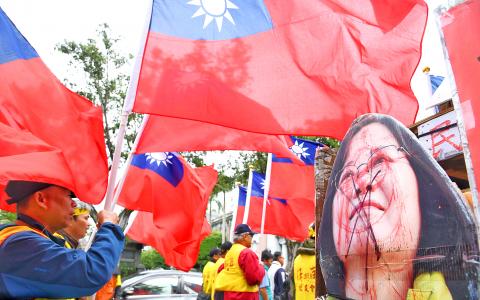Hundreds of veterans yesterday rallied outside the Legislative Yuan in Taipei to protest proposed pension cuts, vowing to stage daily marches for the next three months if the government does not abandon its plans.
An estimated 1,500 people participated in the demonstration, called “Marching for the Rights of 800 Heroes,” including military veterans and members of the Chinese Nationalist Party’s (KMT) Huang Fu-hsing (黃復興) branch.
“800 Heroes” refers to the Chinese soldiers who defended the Sihang Warehouse against Japanese troops in October and November 1937 in the Battle of Shanghai. The battle is considered one of the most heroic and symbolic events in the Republic of China (ROC) Army’s history.

Photo: CNA
“The troops are the first ones the government calls to deal with whatever problems it has and the first to get screwed when it has nothing better to do,” said retired army lieutenant general Wu Chi-liang (吳其樑), who was named the operational commander of the protest.
Unless the government abandons its pension restructuring plans, the protesters will demonstrate daily for three months, Wu said.
The protesters are prepared to offer protracted resistance if the government does not relent after three months, Wu said, without elaborating.
KMT Vice Chairman Hau Lung-bin (郝龍斌) appeared at the demonstration to show his support, saying the demonstration is the veterans’ last resort as the Democratic Progressive Party (DPP) government forces its “unconstitutional” pension bill through the legislature.
Sources said the veterans plan to maintain a continuous protest by pitching tents outside the legislature and marching around the legislature’s premises every day between 11am and 4:30pm.
Retired army lieutenant general Wu Sz-huai (吳斯懷), who stirred up controversy late last year when he attended a state ceremony in Beijing, compared the pension plan to the “Cultural Revolution,” and said the DPP should not “provoke” service members and veterans by “testing our endurance.”
Calling the protest “absurd,” DPP Legislator Wang Ding-yu (王定宇) wrote on Facebook: “The 800 Heroes sacrificed themselves for the survival of the nation, whereas those honorless retired generals want to sacrifice the nation’s finances to line their own pockets.”
“Those people who went to China to play golf with People’s Liberation Army [PLA] officers and chant slogans, such as ‘the PLA and the ROC armed forces are both Chinese armies’ ... did an injustice to their comrades in uniform and Taiwanese taxpayers. Their shamelessness knows no bounds,” Wang said.
The Ministry of National Defense issued a statement calling for calm, saying it is still in the process of drafting pension reform plans for the military and that it welcomes the opinions and demands of active and retired troops.
Additional reporting by Aaron Tu

CHAOS: Iranians took to the streets playing celebratory music after reports of Khamenei’s death on Saturday, while mourners also gathered in Tehran yesterday Iranian Supreme Leader Ayatollah Ali Khamenei was killed in a major attack on Iran launched by Israel and the US, throwing the future of the Islamic republic into doubt and raising the risk of regional instability. Iranian state television and the state-run IRNA news agency announced the 86-year-old’s death early yesterday. US President Donald Trump said it gave Iranians their “greatest chance” to “take back” their country. The announcements came after a joint US and Israeli aerial bombardment that targeted Iranian military and governmental sites. Trump said the “heavy and pinpoint bombing” would continue through the week or as long

TRUST: The KMT said it respected the US’ timing and considerations, and hoped it would continue to honor its commitments to helping Taiwan bolster its defenses and deterrence US President Donald Trump is delaying a multibillion-dollar arms sale to Taiwan to ensure his visit to Beijing is successful, a New York Times report said. The weapons sales package has stalled in the US Department of State, the report said, citing US officials it did not identify. The White House has told agencies not to push forward ahead of Trump’s meeting with Chinese President Xi Jinping (習近平), it said. The two last month held a phone call to discuss trade and geopolitical flashpoints ahead of the summit. Xi raised the Taiwan issue and urged the US to handle arms sales to

State-run CPC Corp, Taiwan (CPC, 台灣中油) yesterday said that it had confirmed on Saturday night with its liquefied natural gas (LNG) and crude oil suppliers that shipments are proceeding as scheduled and that domestic supplies remain unaffected. The CPC yesterday announced the gasoline and diesel prices will rise by NT$0.2 and NT$0.4 per liter, respectively, starting Monday, citing Middle East tensions and blizzards in the eastern United States. CPC also iterated it has been reducing the proportion of crude oil imports from the Middle East and diversifying its supply sources in the past few years in response to geopolitical risks, expanding

Pro-democracy media tycoon Jimmy Lai’s (黎智英) fraud conviction and prison sentence were yesterday overturned by a Hong Kong court, in a surprise legal decision that comes soon after Lai was jailed for 20 years on a separate national security charge. Judges Jeremy Poon (潘兆初), Anthea Pang (彭寶琴) and Derek Pang (彭偉昌) said in the judgement that they allowed the appeal from Lai, and another defendant in the case, to proceed, as a lower court judge had “erred.” “The Court of Appeal gave them leave to appeal against their conviction, allowed their appeals, quashed the convictions and set aside the sentences,” the judges